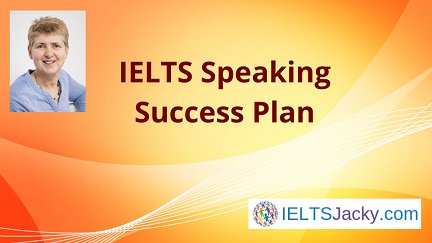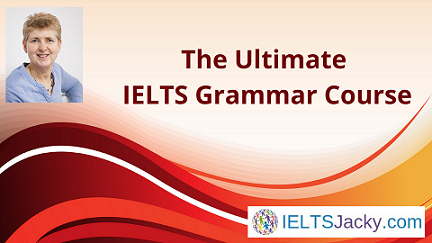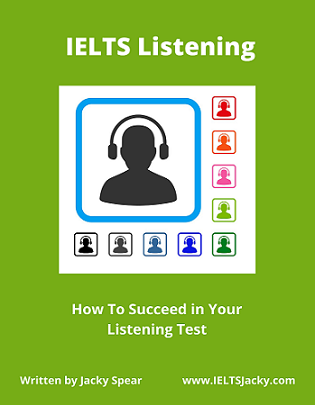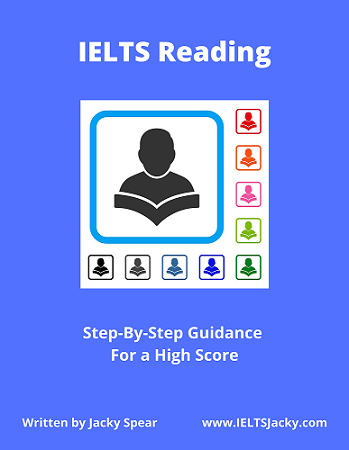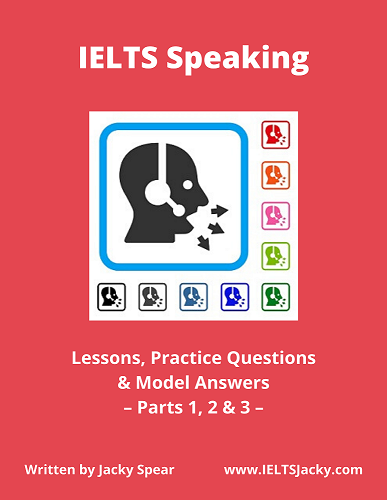IELTS Listening
Multiple Choice Questions
IELTS Listening multiple choice questions are one of the most difficult of all the question types but if you have a good strategy for answering them, you’ll be able to do so successfully. That’s what this lesson will teach you.
The lesson includes:
|
In multiple choice questions, you are required to choose the correct answer from a list of options. There are two main types of question:
|
1) Single questions with a choice of 3 answers (A, B or C). Occasionally, there may be 4 options. 2) List questions. These have a longer list of possible answers and you must select more than one as specified in the question. |
Here are examples of both types of multiple choice questions from a past paper. In this case, they happened to appear together but this is not common.
Read the instructions very carefully.
IELTS Listening multiple choice questions
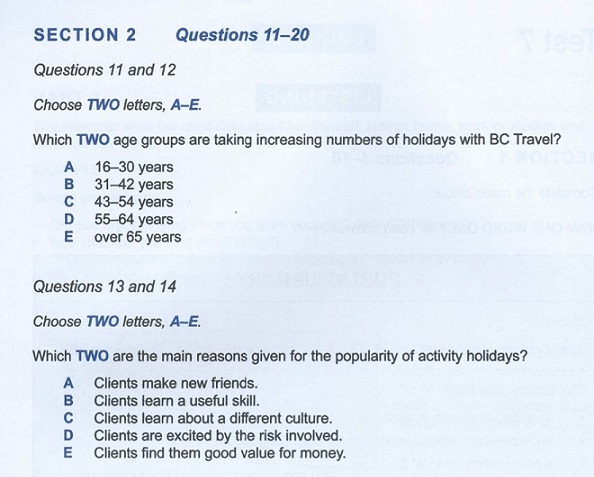
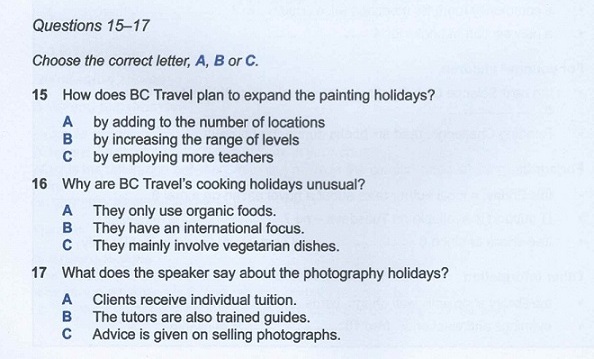
Source: Cambridge English Test Paper
The first set of questions, 11 & 12 and 13 & 14, are list questions. You must choose two answers from answers A – E for each pair of questions.
The second set of questions, 15, 16 and 17, are single questions with three possible answers. You must choose one answers for each from the answers A, B or C.
Now for the strategy for answering multiple choice questions in the IELTS Listening test, including lots of tips and advice on how to overcome the challenges presented by this type of question.
First, here’s the sample question we’ll be working on. It is a simple version of an IELTS Listening multiple choice question and has been created specifically to teach you the strategy.
Sample multiple choice question
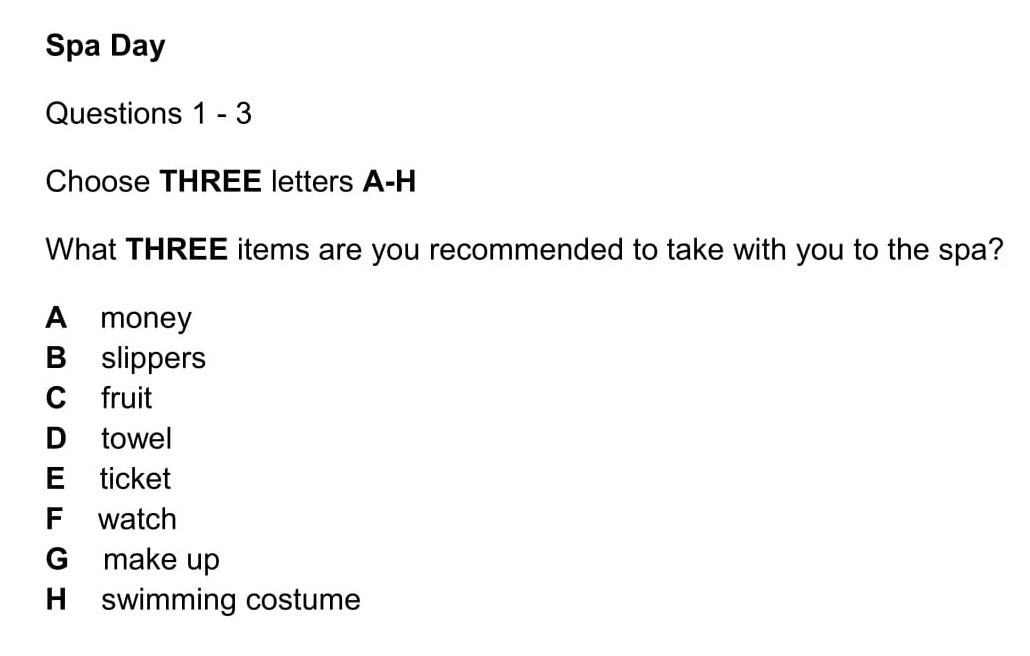
The Strategy
1) Read the question
You will have a short time to prepare before the speaker or speakers begin talking. First, read the question very carefully to ensure that you know exactly what you have to do.
Particularly note the type of question – single with 3 options or list selection with 2 or more answers to identify. For our sample question, we must choose 3 answers. Underline or circle the 3 to remind you.
2) Look for a title
Not every question will have a title but if there is one, it will tell you the context of the question. This will help you to understand the answers listed and give you a big clue as to what sort of information will be contained in the recording.
Our sample question has the title ‘Spa Day’. Knowing the context gives some collective meaning to the words in the list of possible answers which would otherwise appear random and unrelated.
3) Underline the key word in the question
Next, underline or highlight the key word in the question. In this question, it is ‘recommended’.
What 3 items are you recommended to take with you to the spa?
The question is telling us that we must select 3 items that the speaker will recommend that we take with us on the spa day, that is, things we ‘should’ take.
However, don’t expect the word ‘recommend’ to be used throughout the recording. The speaker isn’t going to say, “I recommend that you take a towel and I recommend that you wear a watch.” Synonyms and paraphrasing will be used extensively, so think of some words that might be used instead, including negatives for things you should not take. For example,
“You must…”, “It’s advisable...”, “You shouldn’t…”
I’ll give you more examples in the answers at the end of the lesson.
4) Predict the answer
Now look at the list of answers. You may be able to predict which ones are correct or at least one or two of them, and a couple that are probably wrong.
Try this now. Which items do you think you'd be recommended to take to a spa and which are you unlikely to be asked to take with you?
a) money
b) slippers
c) fruit
d) towel
e) ticket
f) watch
g) make up
h) swimming costume
5) Think of synonyms
Expect to hear all the answer options in the recording, not just the correct answers. You will have to listen very carefully to determine if each item is or is not recommended.
Synonyms will definitely be used for some of the words, so scan the list and see if you can quickly think of any synonyms or related words. An example might be some specific items of fruit for answer (c) instead of the word ‘fruit’.
So, you are not looking for the exact words but the same meaning.
Also, be aware that the answers will not be in the same order as you’ll hear them in the recording.
6) Identify the difference
In single questions with a choice of 3 or 4 answers, the answers may be similar in some way to try and catch you out. If this is the case, underline any key words that will help you to work out the difference in meaning between them. An example for our question might be:
|
7) Watch out for distractors
We already know that all the answers in the list will probably be included in the text, so you need to listen carefully to identify the correct ones. Particularly listen out for distractors as the examiners love to try and trick you into picking the wrong answers.
The way they do this is to give you an answer and then take it away again.
Here are some sentences containing distractors. I’ve highlighted the relevant words.
- I always recommend taking a packed lunch but the spa are providing complimentary refreshments for your visit so you won’t need to.
- The coach will be returning to the hotel at 5.30 p.m. No, sorry, we’ve changed it to 6 o’clock to avoid the worst of the rush hour traffic.
- I don’t usually advise taking any money as everything is included. However, they have a home pamper kit promotion on at the moment so you might like to treat yourself.
So, a distractor is a word or a phrase that changes or corrects the original piece of information given. There will almost certainly be some in the recording so beware.
The best approach to marking the correct answers is to put a tick beside an answer you think is correct but continue to listen carefully in case you find that it’s wrong after all. If it is, you can quickly change the tick to a cross and eliminate the answer from further consideration.
You can write on your test paper as much as you want to. You’ll have 10 minutes at the end of the Listening test to transfer your answers to the answer sheet.
8) Writing the answer
In IELTS Listening multiple choice questions, your answer will almost always be the letter of the answer, not the words. This will be stated in the instructions, for example:
Choose THREE letters A-H
So, if one of the correct answers is ‘A money’, you must write ‘A’ not ‘money’. If you do write 'money', your answer will be marked wrong even though the information is correct.
9) Guess if necessary
Never leave a blank space on the answer sheet. If you miss an answer, take an educated guess. This gives you at least some chance of getting it right. Don’t stress about a missed answer or it will affect your ability to answer the next set of questions. Just make your choice and move on.
Practice Activity
It’s now time for you to practice using this strategy on our sample question. Here it is again.
Sample multiple choice question

Listen to this recording and answer the question. Refer back to the strategy tips as you need to. When you’ve completed the practice activity, go through the answers below which contain lots more tips.
In the recording, you will hear a hotel manager talking to a group of guests about the spa day excursion they’ve booked for the following day.
Answers
First, we’ll look at the correct answers and examine the language that makes them correct. They are:
C fruit
E ticket
H swimming costume
Answer 1: C fruit
Here’s the sentence this answer appears in:
I do recommend popping an apple, banana or some grapes in your bag as a healthy snack in case you feel hungry during the afternoon.
The key word ‘recommend’ has been used, so this one should have been easy to identify as long as you know that apples, bananas and grapes are all items of fruit.
However, if you weren’t listening carefully, you might have been fooled by the preceding sentence.
You’ll be given a light, nutritious lunch so you don’t need to worry about food. However, I do recommend popping an apple, banana or some grapes in your bag as a healthy snack in case you feel hungry during the afternoon.
Did you spot the distractor, ‘however’? The first sentence tells you that you don’t need to take any food and the information is then changed in the second sentence.
Answer 2: E ticket
The next answer is a little tricky as the information is paraphrased.
Don’t forget your pass as you won’t get in without it..
The phrase ‘don’t forget’ is a strong recommendation. In fact, taking your 'pass', a synonym of ‘ticket’, is something you must do in order to gain entry to the spa.
Answer 3: H swimming costume
Finally, we have answer H. Here’s the sentence it’s included in.
As you’ll be enjoying a glass of bubbly in the Jacuzzi, a bathing suit is a must.
Again, a synonym has been used – swimming costume for bathing suit. Saying that you ‘must’ take one is another strong recommendation.
Vocabulary
Now, let’s look at the answers that are not correct to see what language has been used that might have caught you out.
Here’s a transcript of the recording. I've put the phrases or sentences containing these words in red and highlighted the answer options or synonyms where used.
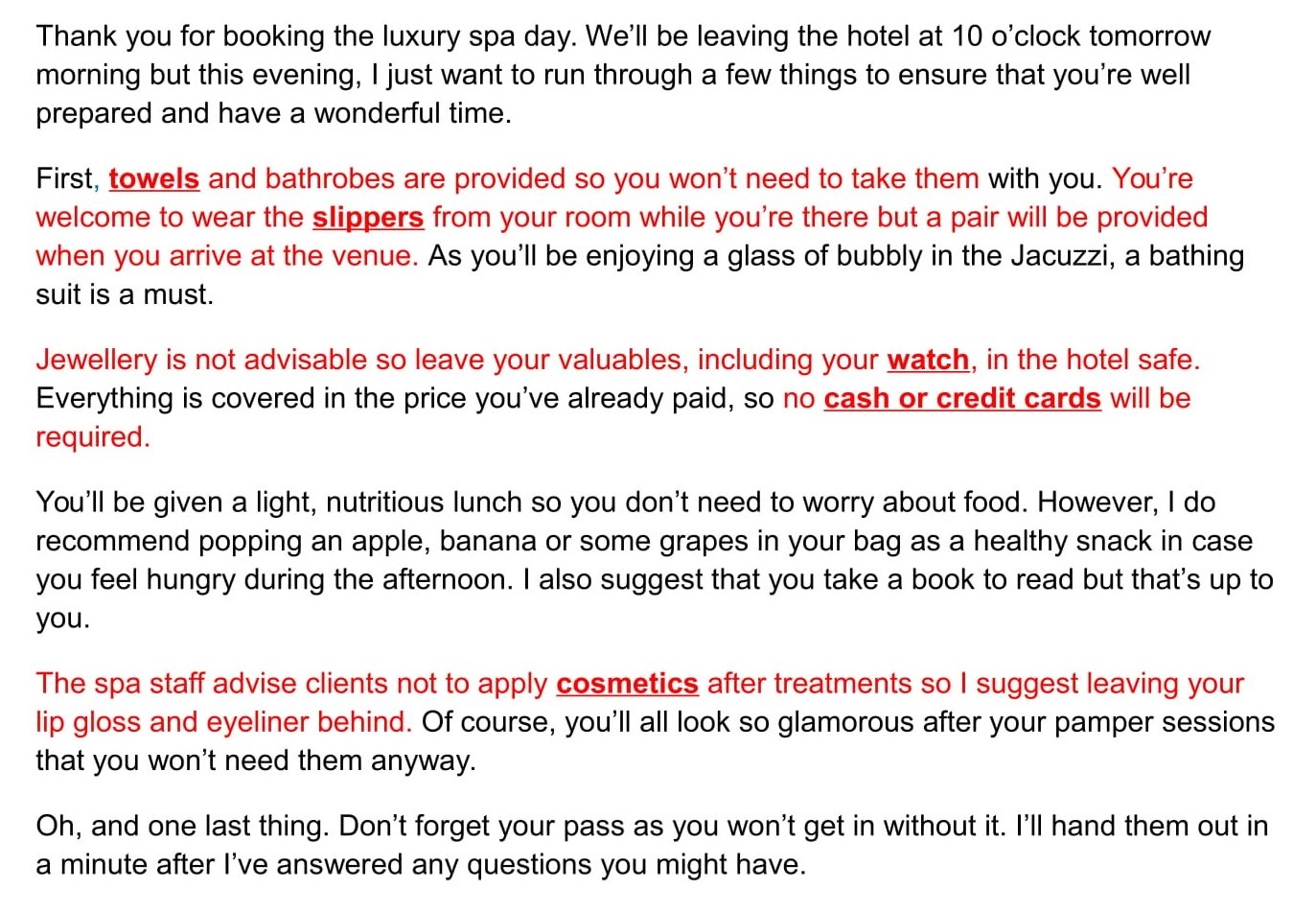
First, we’ll pick out the two synonyms that have been used:
- cash and credit cards – money
- cosmetics (lip gloss and eyeliner) – make-up
Slippers, towel and watch have not been changed.
Next, here are the different words and phrases that have been used to either ‘recommend’ or ‘not recommend’ what items to take to the spa. For some, I’ve added the opposite position in brackets. Both positives and negatives will be used to try and catch you out.
- you won’t need to (you will need to)
- you’re welcome to
- not advisable (advisable)
- no ….. will be required
- advise clients not to
- I suggest (I don’t suggest)
As you can see, there are many different ways to say the same thing.
Another common word that could have been used is should / shouldn’t.
Now practice using this strategy on other IELTS Listening multiple choice questions.
Want to watch & listen to this lesson on multiple choice questions?
Click on this video.
Like this page?
IELTS Listening – All Lessons
IELTS Listening Test – Understand the format & question types. Know what skills are assessed. Also, discover 3 important marking tips.
Listening Strategies – Learn 3 essential listening strategies – question analysis, answer prediction & how to use keyword clues.
Listening Skills – Learn the 4 key listening skills needed for a high score highly. Examples from real questions.
Listening Exercises – 8 listening exercises to help you recognise & learn vocabulary for 6 common topics – time, numbers, prices, dates, letter names & addresses.
The 10 Question Types – Examples of all 10 types of Listening questions. Learn how to recognise & understand them. Links to 10 step-by-step lessons.
Listening Tips – Top 10 tips to bring you success in your Listening test. Essential information you need to know to achieve a high score.
How to Improve Your Listening Skills – 6 simple strategies essential for achieving a high score in the test.
Listening Practice – 4 practice techniques to develop your listening skills
Map & Plan Vocabulary – Learn the vocabulary you need for your test. 5 maps & plans with sample sentences containing common vocabulary of location & direction.
Listening Practice Samples – Short activities to improve your listening skills & help you learn topic vocabulary.
Genuine Full Practice Tests:
The 10 Question Types
Click the links below to learn how to answer each type of question.



